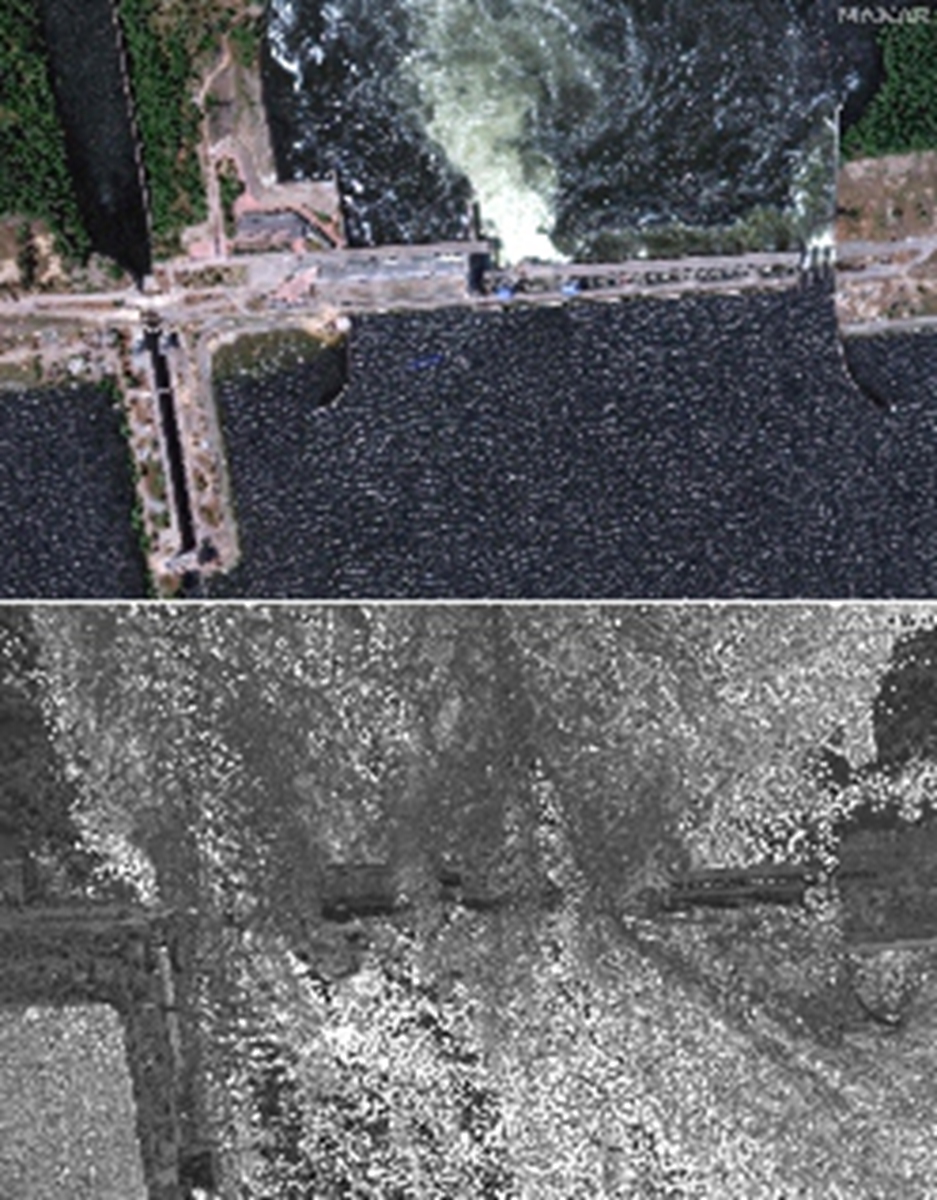
This combination of handout satellite images courtesy of Maxar technologies shows the Kakhovka Hydroelectric Power Station (top) on June 5, 2023 and the same area on June 6, 2023 after it was damaged. Photo: VCG
The Nova Kakhovka dam in southern Ukraine suffered an explosion on Tuesday, triggering flooding. The dam, built in 1956, is considered strategically important as it helps provide electricity, irrigation and drinking water to Crimea and southern Ukraine. The dam was also used to cool the nearby Zaporizhzhya nuclear power plant. Now Russia and Ukraine are blaming each other for the destruction.
This incident marks a new stage in the development of the Russia-Ukraine conflict - it is becoming more irrational, ruthless and unscrupulous. If the war continues to spread, Europe and the world may pay an unimaginable price as a result.
Since last year, the international media has been circulating the "prophecy" of a possible bombing of the dam. The prophecy has unfortunately come true. The Ukrainian army is launching a large-scale offensive, making the incident even more confusing.
The blowing up of the super dam and subsequent flooding has caused significant economic losses, numerous casualties and the displacement of a large number of people. Additionally, the drop in water levels has led to a reduction in cooling water at the Zaporizhzhya nuclear power plant. Rafael Mariano Grossi, director general of the International Atomic Energy Agency, said in a statement, "Our current assessment is that there is no immediate risk to the safety of the plant." However, if the essential cooling water systems are without water for an extended period, the fuel could melt and the emergency diesel generators would become inoperable.
Observers note that over time, the nuclear reactor may face the risk of overload explosion and radioactive leakage. If this were to occur, not only Ukraine but the whole European continent would face a catastrophic disaster.
Since last year, Ukraine has been launching offensives to change its passive situation on the battlefield. Some Western countries have provided Ukraine with advanced weapons, such as MiG-29 fighter jets and Caesar self-propelled artillery. US President Joe Biden also said that the US will support a joint effort with allies and partners to train Ukrainian pilots on fourth-generation aircraft, including F-16s.
No conclusion has been made about the dam explosion yet. But if the West had not been so proactive in fanning the flames of the conflict, would the situation be different?
After the bombing of the dam, both Russia and Ukraine blamed each other, repeating the blame game of the Nord Stream bombings. Both sides are trying to gain an advantage in propaganda, media and psychological warfare.
Not surprisingly, the dam-bombing incident has become an excuse for some politicians in the US and Europe to encourage further escalation of the war. However, the most urgent task now is to implement humanitarian relief, ensure the safety of the local population and the nuclear power plant, and prevent further deterioration of the situation.
If the war does not stop, the total destruction of the dam, a possible accident at the Zaporizhzhya nuclear power plant and other more serious disasters will no longer be just a "sensational" warning.
Will NATO troops go directly into the battlefield in Ukraine? Will there be a nuclear war between Russia and NATO? There are a lot of "predictions" going around, but let's just hope they will not materialize like the scenario in the well-known "The Boy Who Cried Wolf" story. The dam collapse should be a turning point for peace talks.
In order to avoid an even greater tragedy, the international community should accelerate its actions to persuade peace and promote talks to achieve a ceasefire as soon as possible. With this goal in mind, Special Representative of the Chinese Government on Eurasian Affairs Li Hui visited Ukraine, Poland, France, Germany, the EU headquarters and Russia last month to discuss a political solution to the Ukraine crisis.
The bombing of the Kakhovka dam is a serious warning, but it's never too late to fix the problem. NATO, led by the US, should stop sending weapons to the battlefield and urge both sides to sit at the negotiating table, which is the best way to solve the bombing of the Kakhovka dam.
The author is a deputy director and research fellow at the Renmin University of China-St. Petersburg University Center for Russian Studies. opinion@globaltimes.com.cn




